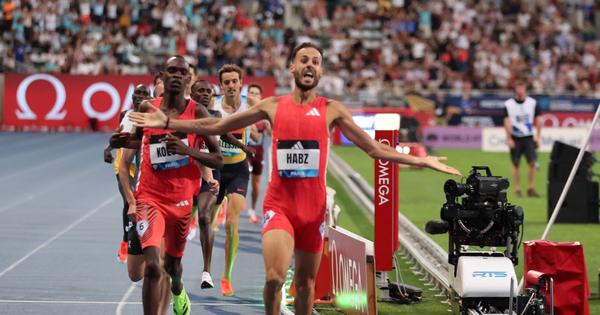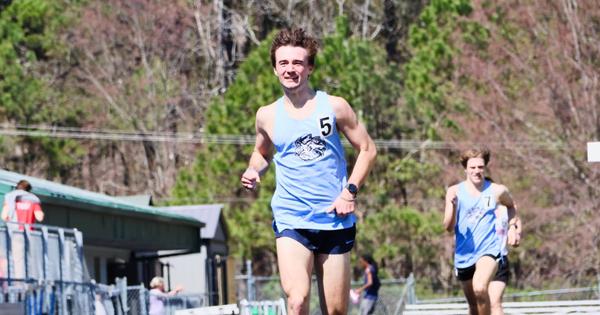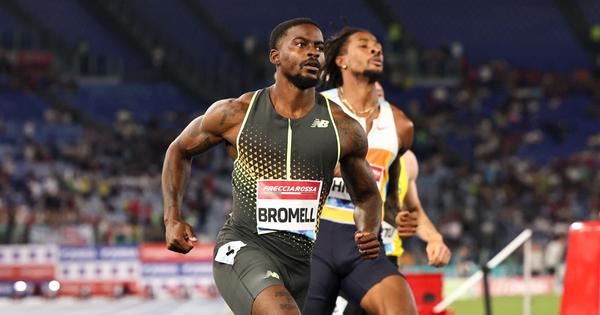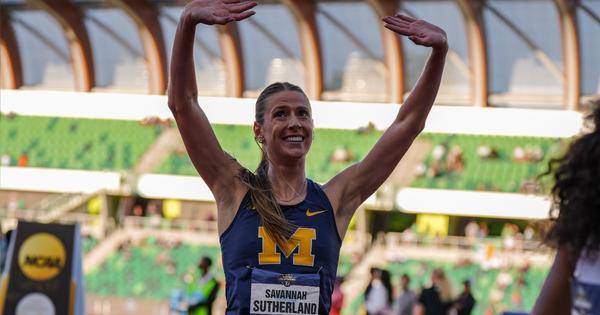By Keenan Baker
June 22, 2025
It’s been a sweltering week in Paris, with temperature warnings rolling through the City of Light (also sometimes known as the City of Little Air Conditioning). It was my first time ever attending a Diamond League meeting, and all I can say is that the only thing hotter than the weather were the times and marks thrown down on this track. Let’s get into it!
7:50pm – Men’s Triple Jump Final
The men’s triple jump took center stage as the Diamond League track festivities were building up. The entire homestretch was nearly filled with fans, and this was still more than an hour before the official TV window of events were to begin.
Hugues Fabrice Zango, the jumper from Burkina Faso, is currently competing in his last full professional season. The seventh best triple jumper in history, and the 2023 World Champion, Fabrice Zango wasn’t close to his peak—but he still put on a show, dueling with Jamaica’s Jordan Scott until the last round. Scott, currently the fifth best jumper in the world, won on a final-round jump that felt, and possibly was, seismic.
8:05pm – Pole Vault Final – Women’s
Katie Moon and Sandi Morris are two of the best pole vaulters in the United States, if not the world. However, this wasn’t the day to produce their best marks, with Moon winning in 4.73m and Morris tying in height, but not in number of attempts.
And even though the French pole vaulter and World Indoor champion Marie-Julie Bonnin finished tied for sixth at 4.53m, she was still flocked by the French fans and media in the mixed zone. Another big shout-out (thanking CITIUS MAG contributor Preet Majithia for his help with this stat) goes to Margot Chevrier who no-heighted all her attempts. She’s currently made a miraculous comeback to even pole vault again after her injury at 2024 World Indoors (a broken ankle with the bone sticking out), and with her goal of competing in the 2028 Olympics, the fact that the multiple-time national champion is pole-vaulting again is a good sign for the French.
I can’t articulate how stunning it was to be in an environment where every event, every attempt was fully cheered by the crowd. Pole vault? Check. Triple jump? Check. Javelin and discus? Check. It felt like a “if you build it, they will come” situation: that means building a great stadium and inviting great fields, then surrounding it all with solid infrastructure and broadcasts.
8:08pm – Men’s 3000m Steeplechase
Lamecha Girma is back to racing, and I couldn’t be happier for him. The world record holder over the 3000m steeplechase took the race out in a measured fashion—and understandably so.
The Ethiopian star hadn’t raced since his brutal fall at the 2024 Paris Olympics that left him with a concussion, and lingering symptoms of dizziness and headaches. Head injuries take months to years of recovery, and that’s simply for day-to-day life—it was never a given that Girma would race again.
The time is less important here. It’s still an impressive 8:07.01, taking first place after staying near the back of the pack and bridging gap after gap to catch his countryman Getnet Wale. In what was a lowkey race, not included in official Diamond League programming, Girma ran extremely well. The fact that he’s running and racing again is enough to celebrate—and doing so in the stadium where he set his world record—makes it even more cathartic.
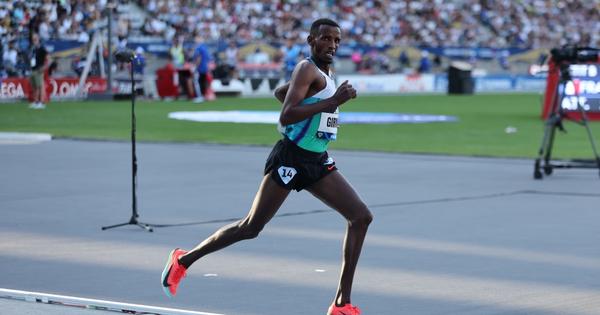
Lamecha Girma | Photo by James Rhodes / @jrhodesathletics
8:10pm – Women’s Discus
Valerie Allman was the far-and-away favorite coming into the meet. The Paris gold medalist has been on a tear this season, throwing 73.52m in Ramona to make her the sixth best discus thrower in history.
She hasn’t lost a discus throw competition since August 2023 and it looked like Paris would be another check in the win column. But it wasn’t until the last throw that Allman could lay claim to the title. Jorinde Van Klinken threw a season’s best 66.42m that held Allman off, and her repeated fouls, including one in the fifth round, kept the series entertaining.
And I’ll be honest, I wasn’t keeping track of the entire field series in the moment. But when I saw it was the final round and that Allman was up to throw, I knew fireworks were about to happen.
67.56m. An almost three meter improvement on her previous throws, and a win by over a meter. An Allman win in the discus feels inevitable. But for a few rounds, Van Klinken gave her a throw for her money, and it was worth the watch.
8:30-8:38pm – 110H Rounds 1 and 2 – Men’s
Heats in the 110m hurdles? In the Diamond League?
When there’s the depth in talent this meet had, it’s understandable.
The heats were clear of fireworks, with Americans Trey Cunningham, Jamal Britt, Dylan Beard, and Grant Holloway all making it to the finals. It was Holloway’s first race in two months, so seeing a 13.16 pop up in the first round has to be encouraging.
It’s hard to say there was a favorite for the race going into the final. Holloway has the fastest personal best in the field, but with injury struggles over the past two months, other hurdlers have battled for the top spot. Cunningham has looked strong all season, but only ran third in his heat—a first heat that saw blazing fast season and personal bests from Japan’s Rachid Muratake and Beard, both running 13.08 (officially separated by three thousandths of a second).
9:04pm – Men’s 400m Hurdles
I’m going to call my shot here and now, and you can hold me to it—I don’t see anyone beating Rai Benjamin in the 400m hurdles this year.
Yes, Karsten Warholm won over 300m, and yes, Dos Santos took him to the line in Stockholm less than a week ago—but Benjamin has looked too good, and too strong.
He ran a 46.54 in his first 400m hurdles race of the year in Stockholm for a meet record. He ran it back in Paris, running 46.93 as a meet record and holding off Abderrahman Samba (who ran a 47.09). He was off to a slow start in the race, too, but ran it controlled and calmly crossed the line ahead of Samba and Trevor Bassitt (who ran a season’s best 48.14). A win is a win for the top-ranked hurdler in the world.
The former meet record holder, Samba, was THE 400m hurdler before the big 3 of Dos Santos, Benjamin, and Warholm took center stage. He’s quietly putting together his best season since becoming the second person to ever break 47 seconds in the 400 hurdles, at this Paris Diamond League meet back in 2018. If he continues this upward trajectory, the medal conversation at the World Championships gets that much more interesting.
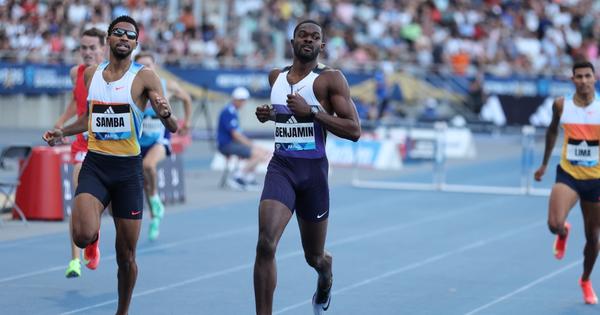
Rai Benjamin | Photo by James Rhodes / @jrhodesathletics
9:06pm – Women’s High Jump
Jumping in front of a sell-out crowd, the Paris Olympics gold and silver medalists put on a show. But once again, like in Stockholm less than a week prior, Nicola Olyslagers got the better of Yaroslava Mahuchikh.
Mahuchikh set the world record of 2.10m at this meet last year, and won the Olympic gold, but has not returned to the same form that she had throughout that historic 2024 summer. She does currently have the world lead of 2.02m, but her record in competition has been less stellar.
Olyslagers has been consistently solid this entire season, and prevailed in her head-to-head matchups against Mahuchikh thus far. You’ll hear me say it again and again, but for these athletes, the build is the World Championships—it’s highly possible the peak form isn’t there yet. Olyslagers and Mahuchikh already trading blows (via jumps) this early in the season is a good sign, even if the heights aren’t there yet.
9:15pm – Men’s 800m
Poor Patryk Sieradzki. The Polish pacemaker signed up for a 49.7s first lap, and fought every step of the race to stay in front of the racers—not because he wasn’t fit enough to do so, but because everyone was nipping at his heels from the start. It took him the entire back stretch to get ahead of the back, and the runners still had to slow down to let him over on the curve.
Wycliffe Kinyamal and Josh Hoey were hip-to-hip at the start of the bell lap, coming through in a blazing fast 49.15.
Sieradzki, once again, had to fight to get off the track at 500m, but it was Hoey breathing down his neck this time, itching to get out of a pack and have some free track ahead of him. Free track he had, and it wasn’t until the 700m mark where Hoey felt the aftereffects of the speedy opening lap.
Mohamed Attaoui of Spain clearly didn’t feel anything. He came through the bell lap third-to-last but flew down the home stretch, passing on the inside of Hoey to sneak away with a win. It was an extremely smart race from Attaoui, who clearly knew he had some energy left in the tank before the final sprint for home and sat on the rail almost the entire time.
If Hoey took the rail, it’s likely Attaoui would’ve sprinted around for the win. Bryce Hoppel was out in lane two, and there was a gap on either side. Hoey was the favorite coming into this race, and still, in my eyes, is the best 800m runner out of anyone in this field—but Attaoui ran a smarter and stronger race. Hoppel finished in third behind Hoey and Attaoui with a season’s best 1:43.11—further improving after a bit of a disaster in Stockholm.
The 800m, as referenced in another article on CITIUS, is a must-watch event this year. Every athlete is hitting another level, and these earlier meets are good lessons in strategy for the new contenders. Hoey won’t leave the rail that open again this season.
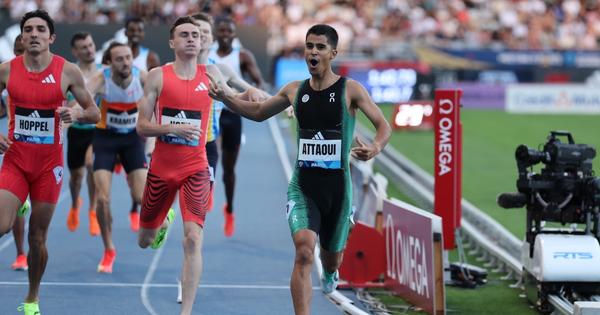
Mohamed Attaoui | Photo by James Rhodes / @jrhodesathletics
9:23pm – Women’s 3000m Steeplechase
Angelina Napoleon ran a huge personal best at NCAAs, finishing in 9:16.66 in the 3000m steeplechase to place third overall and qualify for the World Championship standard. For the NC State sophomore and high school national record holder over 2000m steeplechase, it would be enough to celebrate—she’s seen her personal best drop almost 40 seconds this season, and has put her name in the conversations to become a dark-horse World Championships qualifying candidate.
But then she got invited to the Paris Diamond League. And it was game on.
“I told my coach ‘I don’t care if I raced NCAAs yesterday, I’m coming and racing my ass off!’”
And race she did. Napoleon ran 9:10.72 for seventh place in her debut Diamond League meet, a week after NCAAs. She’s on an insane streak of personal bests right now, the latest of which saw her run the fourth fastest time in the nation this year and the ninth fastest time in American history.
Courtney Wayment and Gabbi Jennings, the fourth and sixth fastest American steeplers ever, both ran in the 9:08s to finish fifth and fourth respectively (first and third in the nation thus far).
First and second saw an epic battle of their own, with Faith Cherotich kicking past Peruth Chemutai to run a world leading and personal best time of 8:53.37. This race saw the first, second, fourth, seventh, and ninth fastest times in the world this year—but that gap between first, second and the rest of the field seems insurmountable.
Napoleon dropped over 44 seconds from her personal best before this season started to put her right in the upper echelon of American women’s steeplers. With Napoleon’s growth and Wayment, Jennings and Lexy Halladay-Lowry all running strong—there’s plenty of cause for celebration for the American steeplechase contingent.
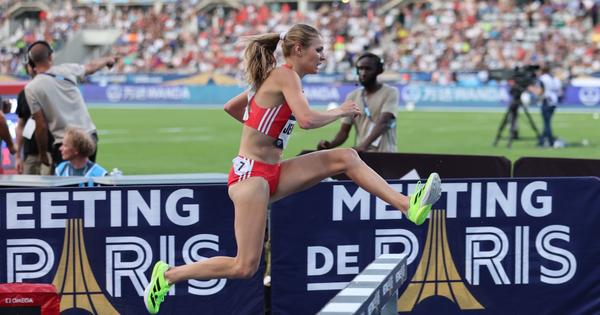
Gabbi Jennings | Photo by James Rhodes / @jrhodesathletics
9:42pm – Men’s Javelin
In a field full of Olympians, Julian Weber and Neeraj Chopra took first and second place, as they so often have this season.
This time, Chopra got the better of Weber, throwing 88.16 to Weber’s 87.88. Weber still maintains the World Lead of 91.06m, with Chopra right behind in 90.23m. The next closest athlete is the United States's Curtis Thompson, whose throw of 87.76m is almost three meters back from the two clear javelin favorites this year.
And while the top two had a less-than-ideal meet in terms of distance, the third place finisher, Luis Mauricio Da Silva threw an extremely strong 86.62m—a new Area Record and personal best for the Brazilian.
9:43 – Men’s 110 Hurdles Final
The semifinals set my expectations high for the finals of the men’s 110m hurdles, and they did not disappoint.
Grant Holloway, again, ran a season’s best in 13.11—finishing in fifth place. Holloway looked the fastest over the first 70m, but like in the heats, faded over the final two hurdles. The American hurdler is unbeatable over 60m, but stringing the final stretches of the race together continues to be a struggle over this season. 13.11 is still solid, and Holloway has time before USAs to put it all together. 13.16 and 13.11 as a rustbuster is pretty damn good.
Jason Joseph and Rachid Muratake, third and fourth, also ran quickly in the final—finishing in 13.07 and 13.08, respectively. Joseph’s 13.07 equals his Swiss national record set in 2023, and Muratake’s 13.08 equals his season’s best, run in the heats.
Trey Cunningham and Dylan Beard, first and second, both ran personal bests in the final—Cunningham tying his with a 13.00 clocking and Beard dropping .06 to run 13.02. Cunningham and Beard are both establishing themselves as two of the best American hurdlers, if not two of the world’s best. It’s only a matter of time before they both break the 13 second barrier.
Cunningham, Beard, Holloway and fellow Americans Cordell Tinch, Freddie Crittenden, Jamal Britt, and Jakobe Tharp are all running quick. Even if I was a betting man, I would not bet on who makes the United States team for the 110m hurdles.
9:51 – Women’s 400m
Marileidy Paulino and Salwa Eid Naser matching up against each other is, and will always be, must-see racing. They went toe-to-toe for the entire homestretch clear of the field but unable to fully separate from each other, and they crossed the line within four-hundredths of a second.
Eid Naser still holds the world lead, set back at Grand Slam Track’s first meet in Kingston, but Paulino continued her winning ways with a 48.81 to Eid Naser’s 48.85. The rest of the field fell behind but still ran well, with Martina Weil running a Chilean national record of 49.83, and Amber Anning running a season’s best 49.96. Isabella Whittaker has run race after race after race in her first Diamond League season, and while this wasn’t her best time, she still posted a 50.18 with a quick closing 100m.
9:59 – Men’s 1500m
I don’t know what I expected from this race.
I knew they were getting paced to 3:28.
I knew people ran fast on the track all evening.
I knew the runners in the field were in good form.
I knew Azeddine Habz going for the French record in front of a sell-out crowd was perfect motivation.
I knew it was going to be fast.
But when the pacer stepped off with 500m to go, and the racers stayed in front of the green wavelights, that’s when I knew it was going to be special.
Every athlete in the field improved their personal bests, except for Abel Kipsang, who was 0.35 seconds off.
The average personal best improvement was 2.2 seconds, and the average season’s best improvement was 3.29 seconds.
The average race time was 3:30.23—in a fourteen person field.
The fastest runner, Azeddine Habz, ran 3:27.49—the French National Record, World Lead, and sixth fastest 1500m of all time.
The second fastest runner, Phanuel Kipkosgei Koech, ran the World U20 Record, in 3:27.72. The 18 year old dropped 4.54 seconds off his PB, set earlier this year—he was a 1:46.93 800m runner before this season.
The third fastest runner, George Mills, ran 3:28.36 to become the second fastest British runner ever over 1500m—hurdling Mo Farah, Jake Wightman, Steve Cram, Sebastian Coe and many more in the all-time standings. The 11th fastest British runner is now the 14th fastest EVER.
I AM NOT DONE.
Three national records—Habz, Stefan Nillesen (the 22 year old) ran 3:29.23 for a Dutch National Record, and Tshepo Tshite ran a South African record of 3:31.35.
The slowest runner, Louis Gilavert, ran 3:32.25.
This race took 3:35 runners and made them 3:31 runners. I can’t attribute it to a single, specific reason—the race had it all.
Perfect pacing—yes. Runners motivated by the crowd—yes. The new shoes and nutrition improvements—yes. The track itself had everyone from hurdlers to distance runners commenting on how fast it felt, so—yes. The weather cooled down to 79 degrees, with little wind and all shade—yes.
Are Habz, Koech, Mills and company contenders now? I don’t know. Koech is a relative unknown, Habz is a contender to make finals but usually not for medals, and Mills has shown incredible gains over the 5000m and 1500m this year. I would not be surprised if they do contend for medals this summer and beyond.
Or is it that middle distance, not just the 800m, is having renaissance upon renaissance? 2024 was historically fast. 2025 looks even faster.
Two other side notes:
- The math on the race times are here in this spreadsheet, for those who love data like I do.
- With Breaking4 right around the corner, Nike has to be pretty happy about choosing the same stadium for their record attempt. I’m ready to see Faith Kipyegon run her fastest, and at Stade Charléty. Who knows what can happen?
10:08 – Women’s 200m
Anavia Battle is undefeated over Diamond League racing this season.
She’s also currently undefeated over the 200m distance—and is putting together a consistently solid resume that makes her a factor coming into championship season.
In this meet, Battle ran a season’s best of 22.27. The second and third place finishers, Amy Hunt and McKenzie Long, both ran season’s bests 22.45 and 22.49. Nobody else ran a season’s or personal best, but the top three got it done—and sometimes, that’s all it takes.
10:20 – Women’s 100m Hurdles
Welcome to the 12.2s, Grace Stark! The short hurdles continued to be fast, with Stark winning the overall race in 12.21, and the world record holder Tobi Amusan running second in 12.24.
Ackera Nugent also ran well, with a season’s best of 12.30.
I remember watching the Women’s 100m Hurdles in 2022, and being incredibly shocked by the 12.12 that Tobi Amusan threw down to break the World Record. Now that we’re three years out, and people are clawing their way back to that mark, I think it’s safe to say the 100m hurdle record is in danger this year. Masai Russell and Jasmine Jones went 12.17 and 12.19 in Miramar, and now Stark and Amusan are within striking distance—with only 0.7 m/s in wind.
The assumption is that contenders are trying to build in time to peak for the national and world championships. With that being the case, it’s hard not to look at these times a month out from championship racing and think the WR is not as far as it once felt like it was.
10:27 – Men’s 5000m
The men’s 5000m was paced to a world record in Paris. It didn’t go down, but Yomif Kejelcha sure as hell put up a fight.
It wasn’t until three laps to go that the lights started to pull away from the Ethiopian, who doggedly committed to the pace from the gun—sitting at the front with all intentions of crossing the finish line alone.
Nico Young and Graham Blanks rolled with Kejelcha through the 3000m mark, and both Americans did an incredible job of competing. Yes, Birhanu Balew, who represents Bahrain, kicked to an Area record of 12:48.67, beating Blanks to the line. And yes, Young faded to seventh, behind new French National Record holder Jimmy Gressier (12:51.59), Samuel Tefera (12:53.44 PB) and Souffiane Bakkali (this isn’t a 3000m steeple! 12:55.49 PB).
I left this race inspired by watching Kejelcha, Young, and Blanks commit to the insane task of running a world record in a 5000m on this random night in Paris. The tanks were more than empty after the race, but they went for it. They found their limits (somewhere around 3-4k), and it makes them all the more ready for whatever comes next.
10:50 – Women’s 1500m Final
Final race of the evening, and it’s the women’s 1500m final.
Once again, everyone ran either a season’s best or personal best (aside from 13,14, and 16th place)—it wasn’t the miracle that the men’s race was, but it was still extremely fast.
Nelly Chipchirchir took home the win in 3:57.02, with Sarah Healy right behind her in a personal best 3:57.15. 11 runners in total ran sub four minutes, which shows incredible depth in not only this race, but women’s running as a whole.
In 2022, only 16 women went under the four minute threshold for the 1500. Last year, 41 women ran under four minutes, and so far this year, 20 runners have. The stakes are getting higher and the times are getting faster, and Paris magic struck in both 1500m races.
Batten down the hatches for the Prefontaine Classic. It’s about to be a good one.
___________________
Keep up with all things track and field by following us across Instagram, X, Bluesky, Threads, and YouTube. Catch the latest episodes of the CITIUS MAG Podcast on Spotify and Apple Podcasts. For more, subscribe to The Lap Count and CITIUS MAG Newsletter for the top running news delivered straight to your inbox.
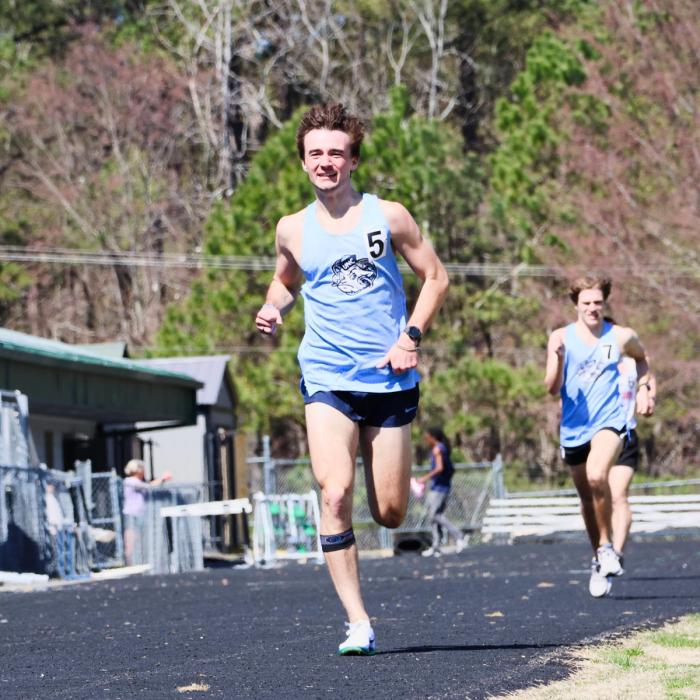
Keenan Baker
Keenan Baker is a track fan. He’s also a journalism major and writer at UNC-Chapel Hill. Putting both of those passions on the page together is the goal, and he looks forward to covering more track and field with CITIUS MAG this summer!
